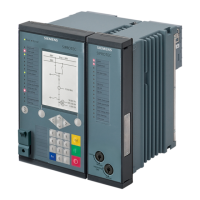The functions General (GAPC), Tap changer (YLTC), and Voltage controller (ATCC) are logical node points in
IEC 61850-8-1.
The tap changer (YLTC) is the interface between the voltage controller (ATCC) and the motor-operated tap
changer of the transformer (OLTC). This means that the voltage controller (ATCC) sends higher and lower
adjusting commands to the tap changer. This tap changer issues command pulses to the motor-operated tap
changer of the transformer (OLTC). The tap changer (YLTC) measures the tap positions and monitors the
action of the motor-operated tap changer (OLTC).
The Parallel control function is needed for the parallel operation of 2 to 8 transformers. The Parallel control
function can only be instantiated in the Voltage controller function group.
The function group has interfaces to the following measuring points:
•
Two-winding transformer:
– Voltage, 3-phase
– Current, 3-phase (optional)
•
Three-winding transformer:
– 2 x voltage, 3-phase
– 2 x current, 3-phase (optional)
•
Grid coupling transformer:
– 2 x voltage, 3-phase
– 2 x current, 3-phase
Figure 6-117 shows these interfaces as a block structure.
[dwvocnti-060913-01.vsd, 3, en_US]
Figure 6-117 Structure of the Voltage Control Function Group
You can find the information and function measured values of the voltage controller in the DIGSI routing
matrix.
Function Description
General
If the load is increased in an electricity-supply system, the voltage is reduced and vice versa. The power trans-
formers are usually equipped with transformer tap changers (OLTC) so as to keep the power-system voltage at
a constant level.
As a result, the transformer ratio is changed in predefined steps. Changes to the transformer taps cause the
voltage to change.
The Voltage control function is intended to control transformers with motor-operated transformer tap
changers.
6.9.3
6.9.3.1
Control Functions
6.9 Voltage Controller
SIPROTEC 5, High-Voltage Bay Controller, Manual 451
C53000-G5040-C015-9, Edition 11.2017

